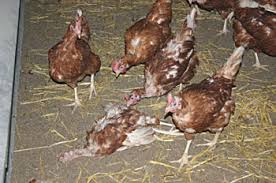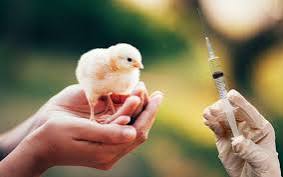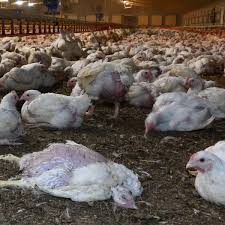Cannibalism in Poultry
 Cannibalistic behavior performed by poultry is the pecking, tearing and consuming of skin, tissues or organs of flock mates. Outbreaks of cannibalism occur in all types of housing systems, including cages, floor pens, aviaries; in outdoor, free-range flocks; and among many different types of poultry, including chickens, ducks, turkeys, quail and pheasants
Cannibalistic behavior performed by poultry is the pecking, tearing and consuming of skin, tissues or organs of flock mates. Outbreaks of cannibalism occur in all types of housing systems, including cages, floor pens, aviaries; in outdoor, free-range flocks; and among many different types of poultry, including chickens, ducks, turkeys, quail and pheasants
Cannibalism in poultry is a costly and vicious habit that poultry producers cannot afford to ignore.
Because there are numerous reasons for outbreaks of cannibalism, it is important that cannibalism control be a part of your management program.
Causes of Cannibalism
1. Overcrowding
If he number of birds is too much for the space provided, the birds are been stressed and which will lead to pecking and cannibalism.
2. Excessive heat
When the birds become uncomfortably hot they can become extremely cannibalistic. Be sure to adjust the temperature as birds age and breed, birds reaction should be monitored.
3. Excessive light
Extremely bright light or excessively long periods of light will cause birds to become hyperactive and hostile toward one another. Never use white light bulbs larger than 40 watts to brood fowl. If larger bulbs are required for heat, use red or infra-red bulbs. When raising birds 12 weeks of age or older, use 15 or 25 watt bulbs above feeding and watering areas. It is not recommended to provide birds with more than 16 hours of light per day. Intermittent light for the first week of life is often recommended.
4. Absence of feed or water or a shortage of feeder or waterer space
Pecking activity will increase if the birds have to fight for food and water, or if the birds are always hungry. Be sure that birds have free access to water and feed. The pecking order determines which birds get to eat and when.
5. Unbalanced diets
Extremely high energy and low fiber diets can cause birds to be extra active and aggressive. Feed lacking protein and other nutrients, particularly the amino acid Methionine and salt, will also cause birds to pick feathers. Make sure you feed a diet balanced appropriately for the age and types of birds you are raising.
6. Mixing of different types, sizes, and colors of poultry
Mixing different ages and sizes of poultry or birds with different traits may promote pecking by disrupting the flock’s normal pecking order. Never brood different species of poultry together in the same pen. Don’t brood feathered leg birds, crested birds or bearded birds with birds without these traits. Curiosity can also start pecking. Toe pecking in the first few weeks is often started due to curiosity of the different colors or traits.
7. Brightly lit nests or shortage of nesting boxes
Don’t place bright lights near the nesting areas. If nest lights are used, they should be turned off as soon as birds begin to find the nests. A general recommendation is to allow 1 nest for every 5 hens; however, the exact ratio required may vary depending on the species, breed, and housing type. Vent pecking by layers is also a common problem.
8. Allowing cripples, injured or dead birds to remain in a flock
Birds will pick on crippled or dead birds in their pens because of the social order and curiosity. Once pecking starts it can quickly develop into a vicious habit. It is best to remove sick or injured birds from the flock as soon as possible. In some cases, it may be necessary to remove the aggressive bird(s) from the flock.
9. Prolapse
Prolapse can occur in very young or fat laying flocks. Prolapse is when the uterus stretches and tears and takes longer to properly return into the body cavity after the egg is laid. This is most common in young flocks that start laying too soon (prior to 20 weeks of age) or in fat layers. When the uterus is exposed for a period of time other birds will see it and pick at it out of curiosity. Once they pick at the uterus it bleeds, and the picking may quickly progress to cannibalism. If you start seeing blood streaks on the shell surface, birds in your flock may be experiencing prolapse. Properly managing how you bring your birds into production and proper feeding practices can prevent this problem. Fat birds will need to be put on a lower energy diet.
Prevention and Control of Cannibalism
1. Provide ample space for birds
Allow the chickens enough room to run around freely. The recommended floor spaces are as follows:
2-week-old birds: 230 cm2 / bird
Birds from 3 to 8 weeks: 460 cm2 / bird
Birds from 8 to 16 weeks: 930 cm2 / bird
Birds 16 weeks and older: 1400 cm2 / bird
2. Provide enough feed and water
Make sure that all your chickens have access to enough feed and water always so that they are completely satisfied and do not have to resort to pecking.
3. Provide a balanced diet
A diet that covers the nutritional requirements of the birds will prevent them from becoming cannibals. Be sure to provide your birds with a well-balanced diet for each stage of their development.
4. Provide greens
We recommend that you supply your birds with a good amount of green, clover or any other herb, as these foods are rich in fiber and make the chickens’ crop keep full and satisfied.
5. Salt solution
A deficiency of sulfur and salt in the feeds of birds could trigger the pecking habit in a flock by increasing the birds’ appetite for blood (blood contains salt and sulfur). The addition of one tablespoon of salt to one litre of water and the solution should be given as the only drink for half a day. It is then replaced with regular drinking water. If this does not check the cannibalism within a day or two, it is repeated after a period of three days. If the trouble is due to a lack of salt, it will correct the situation.
6. The right temperature
Make sure that the space where your birds live is cool, so that the chickens feel comfortable and don’t get stressed. Maintain a temperature of 35°C for the chicks during the first week, then reduce the temperature to 2.7°C per week, until finally reaching 21°C.
7. Maintain adequate light intensity
Avoid using white light bulbs over 40 watts during chick growth. If you require powerful light bulbs to provide heat, use infrared lamps. For birds 12 weeks of age and older, we recommend 15 or 25-watt lamps in the drinking and feeding areas. Avoid lighting the environment for more than 16 hours a day.
8. Deworm the birds
Try to regularly medicate your birds against parasites, since as we have mentioned, parasitized birds usually resort to cannibalism.
9. Remove sick or injured birds from the house
If you notice that any of your chickens is mutilated or injured, it is best to separate it from the rest of the healthy birds to prevent others from pecking at it. Likewise, if you notice that some of your chickens have developed the behavior of pecking, you should also separate it from the rest of the birds, since the chickens have a natural tendency to imitate the others around them. So if one of the birds starts pecking, others will start doing the same and cannibalism will spread rapidly among them.
10. Debeak the birds
This is very simple but could be laborious. Beak trimming or clipping could be the solution for a large flock) while for small flocks, preventive measures are recommended.





